High Blood Pressure
High blood pressure, also known as hypertension. It is a common illness where the blood's long-term push on your artery walls is so great that it may eventually result in health issues, including heart disease.

Blood pressure levels are affected by the amount of blood pumped by the heart pumps and the resistance provided by the walls of the arteries to the flow of blood. Your blood pressure will increase as your arteries become constricted and your heart pumps more blood. The blood pressure measurement is in millimeters of mercury (mm Hg). There are two of them.
- The top number or systolic pressure - The first figure, which is higher, represents the pressure created by your heartbeat in your arteries.
- Diastolic pressure is the pressure on the walls of arteries exerted between simultaneous
If your high blood pressure is uncontrolled, you have a higher risk of developing significant health issues, such as heart attack and stroke. Thankfully, elevated blood pressure is simple to see. A doctor may advise getting normal levels of blood pressure and advice on how to keep control over blood pressure in a situation when there is increased blood pressure.
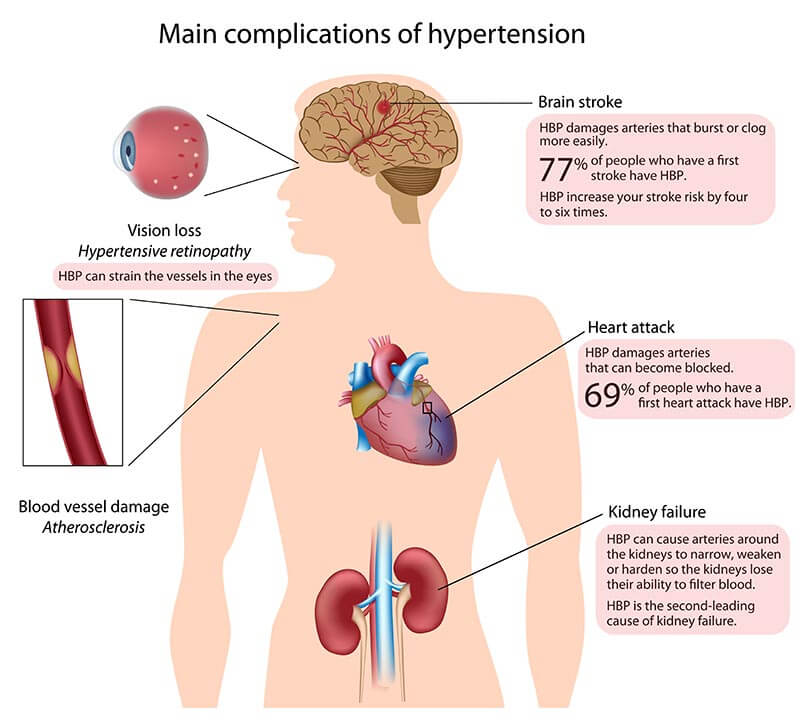
Some individuals with abnormally high blood pressure may experience:
- Headaches
- Shortness of breath
- Bleeding of nose
When to visit a doctor
Your blood pressure will probably be taken during a typical doctor's visit. Beginning at age 18, request a blood pressure check from your doctor at least every two years. Ask your doctor to take your blood pressure once a year if you are older than 40 or have a high risk of developing high blood pressure if you are between 18 and 39.
In general, blood pressure readings in both arms should be taken to see whether there is a difference. It's crucial to utilize an arm cuff that is the right size. Regular measurements are advised for people with abnormally high blood pressure or heart diseases. Typically, blood pressure checks are performed on children 3 and older as part of yearly examinations.
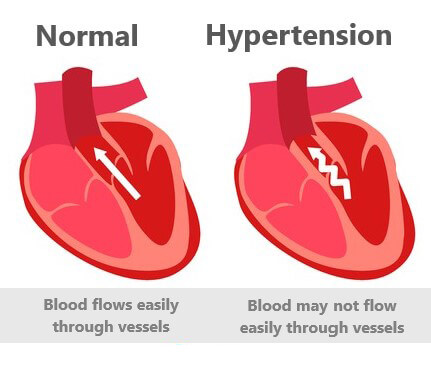
Public blood pressure monitors, like those found at pharmacies, could tell you useful things about your blood pressure, but they might also have some limits. These devices' accuracy depends on several variables, including the right cuff size and optimal machine usage. For guidance on utilizing public blood pressure monitors, see your doctor.
Causes
There are two forms of hypertension.
- Early-stage hypertension
For the majority of individuals, high blood pressure has no known cause. Primary or essential hypertension is the stage with high blood pressure that develops gradually.
- Subsequent or secondary hypertension
Some individuals suffer from high blood pressure brought on by an underlying ailment. Secondary hypertension is the stage of high blood pressure that develops spontaneously and increases blood pressure. Secondary hypertension can result from a variety of medical conditions and drugs, such as:
- Obstructive sleep apnea
- Kidney illness
- Adrenal gland tumors
- Thyroid issues
- Certain blood vessel flaws are congenitally present at birth.
- Prescription pharmaceuticals, over-the-counter painkillers, cold meds, decongestants, birth control pills, and other medications
- Illicit substances like cocaine and amphetamines
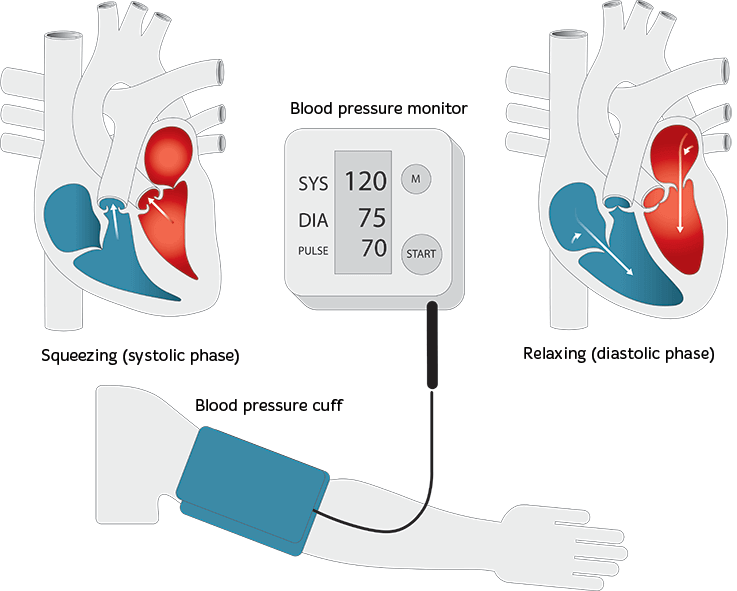
Risk elements
Various risk factors of high blood pressure are:
- Age: Age increases the chances of abnormally high blood pressure. Increased blood pressure is highly prevalent in men until 64 years of age. After 65 years of age, women have more chances of high blood pressure.
- Race: Certain races, like African Americans, have high chances of high blood pressure, and frequent manifestations are made in earlier stages of life than in white individuals. People of African ancestry also tend to experience more severe consequences, including heart attack, stroke, and renal failure.
- Family background: Blood pressure issues frequently run-in families.
- Being fat or overweight: More blood is required to provide oxygen and nutrients to your tissues when your weight increases. Blood flow through your blood vessels increases along with the pressure on the artery walls.
- Being inactive physically: Inactive people typically have greater heart rates. The more enhanced the heartbeat is, the harder it gets for the heart to contract, and high pressure develops on Being overweight is also more likely when you don't exercise.
- Tobacco use: In addition to temporarily raising blood pressure when you smoke or chew tobacco, tobacco products include chemicals that can harm the lining of your artery walls. The arteries constrict, and it increases the chances of developing cardiovascular The risk of cardiovascular diseases might be increased by smoking.
- Sodium (salt) in your diet in excess: Your body may retain fluid due to eating a diet high in salt, which raises blood pressure.
- Your diet has insufficient potassium: When sodium levels in your cells are out of balance, potassium helps. For healthy hearts, potassium levels must be balanced properly. Increased sodium levels build-up in the blood if enough potassium levels are not maintained. If too much potassium is lost due to dehydration, ionic imbalance may occur.
- Ooverindulging in booze: Excessive drinking might harm the heart. Blood pressure is affected by the consumption of more than a single drink in a day.
- Alcohol consumption must be done sparingly, entailing one drink in a day for women and two drinks in a day for healthy males.
- Stress: High-stress levels might lead to a small rise in blood pressure levels. Stress-associated behaviors can increase blood pressure, including smoking, drinking alcohol, and binge eating.
- Diabetes, sleep apnea, and renal diseases are a few medical conditions leading to high blood pressure. Elevated blood pressure may be associated with pregnancy.
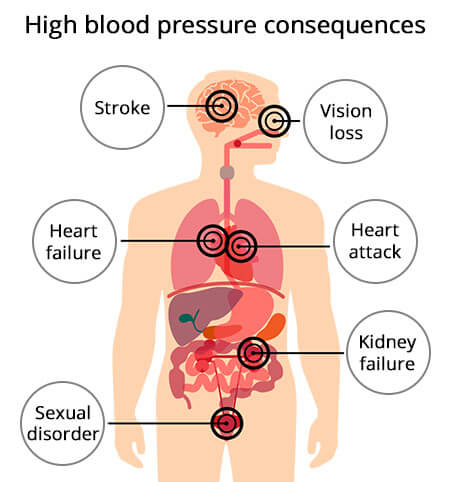
Adults have more chances than children to have elevated blood pressure. However, a rising percentage of children develop high blood pressure due to poor lifestyle choices such as an unhealthy diet and inactivity. Renal or cardiac issues bring on some children's high blood pressure.
Complications
Elevated blood pressure may harm organs and blood vessels due to higher strain on arterial walls. The harm increases when your blood pressure rises and remains uncontrolled for longer. Uncontrolled hypertension can result in issues like:
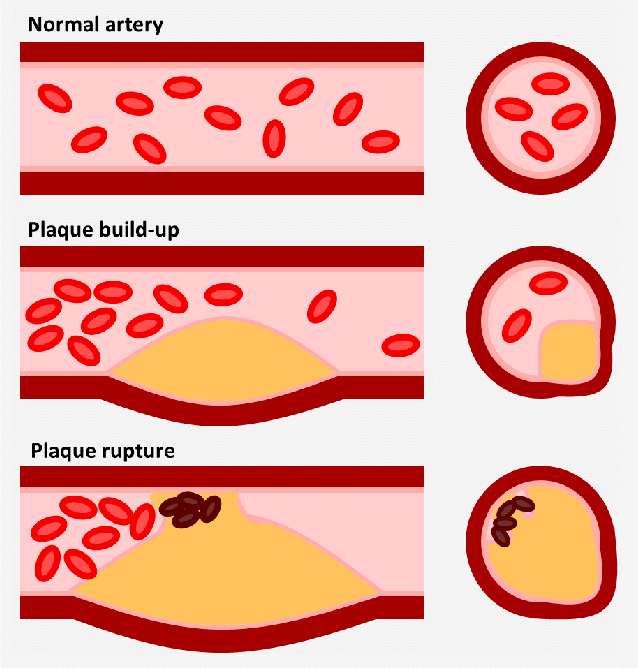
- Angina or a stroke - Strokes, heart attacks, and other medical issues result from atherosclerosis (hardening or thickening blood vessels, especially arteries).
- Aneurysm - Your blood arteries may weaken and swell due to high blood pressure, developing an aneurysm. A ruptured aneurysm may pose a risk to life.
- Heart attack - The heart has to pump blood even harder against the pressure of The arterial walls of the heart and the walls of chambers get thicker leading to heart failure as the pumped blood is not enough blood to meet the body's demands.
- Your kidneys' blood arteries have become weaker and narrower. This may hinder the regular operation of certain organs.
- Blood vessels in the eyes that are enlarged constricted, or torn. Loss of eyesight may come from this.
- Metabolic disorder - This syndrome is a collection of metabolic abnormalities in your body, including a bigger waist, higher triglyceride levels, lower HDL cholesterol (the "good" cholesterol), higher blood pressure, and higher insulin levels. Diabetes, heart disease, and stroke are all illnesses that increase your risk of developing them.
- Memory or comprehending issues - Uncontrolled high blood pressure may impact your capacity to think, remember, and learn.
- Dementia - Narrowed vessels and arteries that get blocked restrict the blood flow resulting in vascular dementia. Strokes that occur due to blood cut-off and eventually oxygen supply lead to Vascular dementia.
|






 For Videos Join Our Youtube Channel: Join Now
For Videos Join Our Youtube Channel: Join Now









